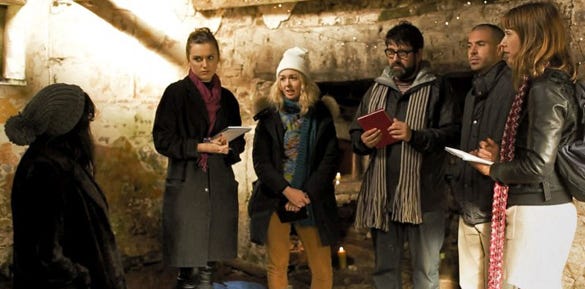Indy Film Fest: Black Mountain Poets
For more information and showtimes, click here.
It’s not often one comes across a movie about two sisters embarking on an unexpected journey of self-discovery that doesn’t become bogged down in exaggerated sibling rivalry or a tedious love triangle. “Black Mountain Poets,” one of the World Cinema Features at this year’s Indy Film Fest, contains both those plot points but miraculously sidesteps them to create a touching and wholly human film about two women looking for something more and finding it in the most unlikely of places.

Written and directed by Jamie Adams (“Benny & Jolene,” “A Wonderful Christmas Time”), “Black Mountain Poets” centers around lifelong and lovably inept con-woman sisters Claire (Dolly Wells of “Doll & Em” and “Pride and Prejudice and Zombies") and Lisa (Alice Lowe of “Hot Fuzz” and “Garth Marenghi’s Dark Place”), who run out of gas while on the lam in the Welsh countryside and thus steal a car from two distracted tourists. The tourists turn out to be the Wilding sisters, somewhat famous beat poets Terry and Alys, who are on their way to be featured guests at the inaugural retreat of the Poet’s Poetry Society in the Black Mountains. Naturally, Claire and Lisa decide to take advantage of this perfect getaway, posing as the poet sisters until one of their crime partners can extract them from their troublesome situation.
What follows is an understated comedy of mistaken identity. None of the poets doubts that Claire and Lisa are the Wilding sisters, and while Claire privately panics that they can’t pull this off, Lisa (as Alys) takes an instant liking to Richard (Tom Cullen of “Weekend” and “Downton Abbey”), a kind poet suffering from writer’s block and an overbearing, more successful girlfriend, Louise, (Rosa Robson in her screen debut). The two not-Wilding sisters decide to stay when a cash prize is revealed for the best poem composed after a camping trip in the mountains, and in doing so get a little more than they bargained for.
I won’t spoil the rest of the movie for you because it’s absolutely worth going through Claire and Lisa’s journey with them. It feels natural thanks to the improvised script and realistic performances, it takes its time, and the gorgeous scenery has as much of an effect on the audience as it does on the characters. As the sisters reveal more of themselves to each other and to Richard, you can’t help but love them — isolated, nervous Claire (nicknamed “Dame Judi Clench” by Lisa) who really just wants a family and spacey yet sharp Lisa, who acerbically reads a grocery receipt in the style of a beat poem just to prove a point.
And blessedly, the aforementioned love triangle isn’t really one at all. There is one moment of jealous lashing-out between the sisters, but once one realizes that the other’s connection with Richard is much more meaningful than hers, she gracefully backs off and lets the romance bloom without her. That’s pretty rare in any comedy, and practically nonexistent in American big-budget ones that constantly pit women against each other for a man, for the title of “best bridesmaid” or for whatever the ridiculous set-up happens to be that year.
In fact, the only thing that disappoints in this movie is Louise. She’s the harpy from the start, the jealous girlfriend who is both a bully and a brat, and her character is so one-dimensional that she feels like a caricature in the midst of real humans. At one point, Richard even tells her, “You’re better than this,” but without any sort of foundation for that, it’s hard to believe. Louise is just there as an obstacle, the living embodiment of why you should root for Claire and Lisa and not the jilted ex. It would have been nice to see this type of character treated with the same subtlety as the others, but the fact that she isn’t is a very small mark against a very well-made movie.
“Black Mountain Poets” is special because it has all the beats from a mistaken-identity comedy that you recognize, only it makes them feel real. Nothing is overblown here, nothing is exaggerated. The revelation of Claire and Lisa’s true identities is not a betrayal that requires another third act to resolve; it’s inevitable, yes, but it’s not that big of a deal. Really, the big deal is that Claire and Lisa find some measure of acceptance in this microcosm of poetry they stumbled upon, while also finding that acceptance among themselves. It’s a simple story told in a profoundly simple way, and told so well that the journey truly is just as important as the destination.


